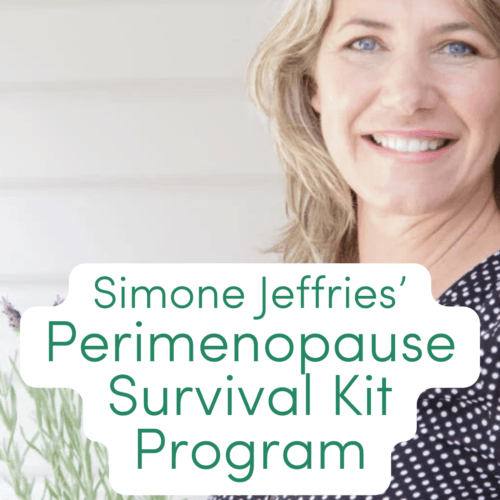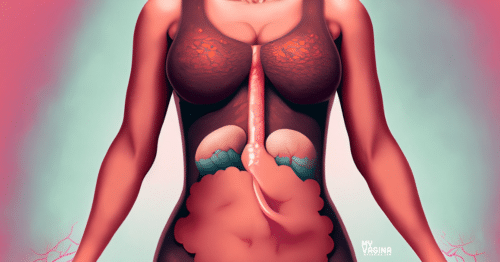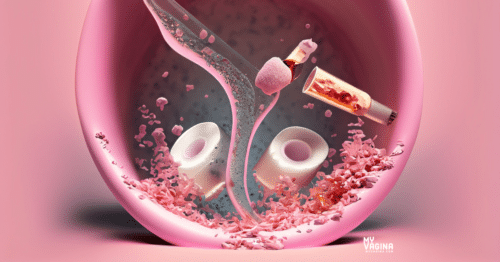Menopause in a nutshell
- The word ‘menopause’ is actually in reference to the very last period a person will ever have – meno (menstruation) pause (pauses!).
- Menopause normally occurs between the ages of 45 and 55.
- Surgical menopause means both ovaries have been removed surgically.
- Natural menopause is the loss of ovarian follicles, ovulation and hormone production.
- The loss of oestrogen in any form of menopause can cause unpleasant symptoms like hot flashes, night sweats, amongst many others, including vaginal and urinary tract symptoms.
- Perimenopause refers to the years beore the very last period (menopause) and can be a time of great hormonal fluctuations, menstrual irregularities, and urogenital and other symptoms.
- Management of menopausal symptoms – peri and post – may require care from a qualified, menopause-experienced practitioner such as Simone Jeffries – book an appointment here.
Defining what is and isn’t menopause
Postmenopause is when a peson hasn’t had a menstrual period (bleed) for 12 or more months. The ovary loses its follicles, ovulation does not occur, and the result is no production of cyclic oestrogen and progesterone.
The age of natural menopause
It’s normal for natural menopause to occur between the ages of 45 and 55, with the average about 51. You can look back on your family history, if you know of it, to see what age the women on your mother’s side hit menopause to see when you can likely expect it.
Menopause is considered ‘premature’ if it occurs between ages 40 and 45.
Surgical menopause
After both ovaries have been surgically removed (a bilateral oophorectomy), a person is considered to be in surgical menopause, as the ovaries are no longer there to produce cyclic hormones.
Ovarian insufficiency and premature menopause
If someone has ovarian insufficiency at a younger age, premature menopause can occur as ovarian function slows and stops.
Premature menopause may also occur due to cancer treatments such as chemotherapy or radiation therapy.
Optimising for a postmenopausal existence
Now that we live longer than ever, a third of our lives could be in postmenopause. Optimising our health for this low oestrogen third is important, as many big changes occur.
Understanding perimenopause – the transition time
Before the very last period occurs is a transition phase starting from about age 42 or 43 where the ovaries wind down their activities. During perimenopause hormones can fluctuate dramatically, sometimes with very unpleasant symptoms.
Though, some people fly thorugh perimenopause without so much as a hot flash. Lucky them!
Some menstrual cycles in perimenopause will be anovulatory, meaning an egg is not released, and therefore progesterone is also not released. Low levels of progesterone cause the first level of symptoms, starting in our early 40s.
Menstrual cycles can become irregular during perimenopause. Cycles may be shorter or longer, periods may be extremely heavy (flooding) and long.
Symptoms of perimenopause include hot flashes, night sweats, aches, pain, fatigue and mood issues. Premenstrual symptoms may become worse, such as tender breasts.
Perimenopausal symptoms may last for 5-10 years. Expect from your early 40s for perimenopausal hormonal changes to be occurring to you, with the first shift being to lower progesterone.
Progesterone is an antianxiety and sedative, amongst many other things, so an increase in insomnia and anxiety might be your first signs.
Can I get pregnant during perimenopause?
Yes! Ovulation and pregnancy can occur during perimenopause. Contraception is still required if you do not wish to get pregnant.
Symptoms can be mild to severe, though around 20% of people report no menopausal symptoms at all.
Don't be a victim to perimenopause
Have an amazing perimenopause journey - get the best help!
- 45-minute private consultation with Perimenopause expert naturopath Simone Jeffries
- 2 interesting, informative, fun masterclass videos
- US$60 store credit for treatment
Both peri and postmenopausal symptoms can include:
- Hot flashes/hot flushes
- Night sweats
- Insomnia and sleep issues
- Body aches
- Body pains
- Dry skin
- Vaginal dryness
- Vaginal symptoms and microbiome disturbances
- Loss of libido
- Increased urinary frequency
- Increased incidence of urinary tract infections (UTIs)
- Mood changes
- Temporary deficiency of memory, ‘can’t quite find the right words’
- Unwanted hair growth (hirsutism)
- Itching and thinning scalp
- Pubic hair changes
- Skin changes
What is a hot flash/hot flush?
A hot flash or flush (the same thing) is a vasomotor symptom. It is a sensation of extreme heat with redness as blood vessels near the skin’s surface dilate (widen), allowing more blood flow to cool the body. The body’s core temperature then drops.
Oestrogen deficiency causes a narrowing of the ‘thermoneutral zone’, which can cause sensations of extreme heat even though perhaps just a small increase in core temperature was experienced. Hot flashes can come out of nowhere.
The body overreacts to a perceived temperature increase and acts accordingly to cool itself through sweating and redness to dissipate heat. The hot flashes pass.
These hot flashes can severely interrupt sleep, as they can occur any time, causing night sweats and discomfort. Disrupted sleep can have a huge impact on relationships, career, wellbeing and quality of life.
These symptoms should be taken seriously and treated – schedule a consultation with Simone Jeffries, our resident perimenopause and menopause expert, for 100% natural, targeted and effective menopausal symptoms.
SCIENCY STUFF
There are varying theories about why this occurs, with one being the hypertrophy of KNDY neurons in the hypothalamus – our thermoregulator – found in postmenopausal women. These neurons produce Neurokinin B, which appears to induce a hot flash.
- Rance NE, Krajewski SJ, Smith MA et al. Neurokinin B and the hypothalamic regulation of reproduction. Brain Res. 2010;1364:116-128.
Three-quarters will experience hot flashes, with a quarter of those people having severe symptoms. The usual time for these symptoms is about seven years but can be as short as two years.
The reporting of hot flushes varies depending on ethnicity and country.
Genitourinary syndrome of menopause (GSM)
Urogenital symptoms can occur during menopause, with many suffering in silence with vaginal dryness, irritation, odour and laxity.
Symptoms of GSM include:
- Dryness
- Burning
- Itching
- Irritation
- Decreased vaginal moisture and natural lubrication during sex
- Painful sex (dyspareunia)
- Increased risk of UTI
Once oestrogen drops, the result is thinning pubic hair, and the fat pad on the labia reduces. The inner labia (labia minora) will also start to shrink and thin while the vaginal mucosa changes.
Low oestrogen symptoms in the vaginal and urinary tract may last, not resolving like many other menopausal symptoms do once the transition is over.
Cognition and psychological symptoms during menopause
As the brain adapts to a low-oestrogen environment, several symptoms can occur temporarily, such as problems with memory recall.
The collection of symptoms and hormone shifts can result in negative mood changes, anxiety, forgetfulness, problems focusing, ‘brain fog’, ‘brain fade’, problems making decisions, and irritability.
With the drop in oestrogen comes a 50% drop in the neurotransmitter serotonin. While we know that ther is not an increased risk of depression at or postmenopause versus other stages of life, if someone is prone to depression (including post-natal depression), and a stressful time during perimenopause, mood problems may occur more readily.
How skin and hair changes in menopause
Premenopausal oestrogen levels are related to abundant substances that promote sebum production, retain water, and improve the skin’s barrier function. Therefore, once oestrogen drops, these substances decrease simultaneously, resulting in dry skin.
Elastins in the skin degrade, and small blood vessels in the skin reduce, causing the skin to thin. Armpit and pubic hair decrease. Some people report itchy skin or even a feeling of ants crawling on them.
Changes to muscle and bone in menopause
Postmenopause is associated with a reduction in muscle mass and strength. With the reduction in oestrogen comes a reduction in growth hormone, IGF-1 and DHEA, less muscle building, and an increase in inflammation.
It’s useful to note that nutrition needs occur as we age, and this is a particularly important time for ensuring plentiful protein, physical activity and plenty of anti-inflammatory foods, activities, and if necessary, supplements.
Osteoporosis – how does this happen?
Oestrogen prevents bone loss and can restore lost bone. In osteoporosis, bones lose density or mass, becoming more fragile. Bone fragility contributes to fractures.
A third of those postmenopause will experience what’s known as a ‘fragility fracture’, which is a huge risk and a leading cause of ongoing health problems and can lead to premature death.
All postmenopausal people should get an osteoporosis risk check and make sure to take preventative steps to maintain bone density, which is laid down in our 20s and 30s. The oral contraceptive pill reduces bone density, FYI!
Menopausal metabolism
Dropping oestrogen levels contributes to changes in metabolism. The body shape most associated with an older man – round belly, skinny little legs – is due to the influence of androgens and where fat is stored. Postmenopause, that’s what we’re all destined for, metabolically speaking.
Changes include more fat around the organs (visceral fat), an increase in blood lipids, changes to blood vessels, blood vessel dysfunction, insulin resistance, increased blood pressure and an increased risk of clogged arteries (atherosclerosis).
Diagnosis of menopause
Menopause is not a disease, but it is an important changing of the seasons for women and people with female reproductive tracts. Menopause can be diagnosed as a cause or contributor of symptoms based on some key criteria.
If the ovaries have been surgically removed, this causes menopause.
The symptoms and changes in periods and menstrual cycles can be evaluated. A practitioner may use a score sheet to determine symptoms and whether treatment is recommended.
Blood tests may also be performed. Follicle-stimulating hormone (FSH) and leutinising hormone (LH) may be checked, but this is not required to determine if someone is in perimenopause or menopause.
FSH alone is not a reliable indicator of perimenopause, as hormones shift sometimes quite a lot from one day to the next.
Investigations may be recommended, in particular when the person has had a hysterectomy, the symptoms may be due to another condition (like the thyroid), or when the person is under 45.
Menopausal symptom management
We can’t avoid perimenopause and menopause, but smoothing the way is within our reach with the right help at the right time.
Management of menopausal symptoms includes lifestyle modifications, natural herbs and supplements to support sleep, hormones and anxiety, exercise, eating well for your hormonal stage, and getting support where it is needed.
Medical treatments may include birth control and non-hormonal and menopausal hormone treatments.
Juggling menopause along with everything else
Typically, menopausal symptoms hit just when life is extremely busy – kids, career, caring for elderly parents and juggling a lot of balls at once. The anxiety and other symptoms may even feel ‘justified’ – “Well, I am so busy, it makes sense that I feel anxious and overwhelmed”.
There are a lot of changes that occur from age 45-55, and some of the symptoms can be severe. Getting help is really important, and good help exists!
Get effective, personalised natural treatments with Simone Jeffries
Simone Jeffries can guide you through perimenopause and well into menopause to minimise symptoms and keep you healthy with strong bones into older age.
Schedule an appointment with Simone and get the help you need to feel good through perimenopause and alleviate your symptoms. She’s brilliant!
Menopause isn’t a bad thing; it’s completely normal and natural, but it does come with its own set of unique shifts in your body – the body you thought you’d just got used to.




